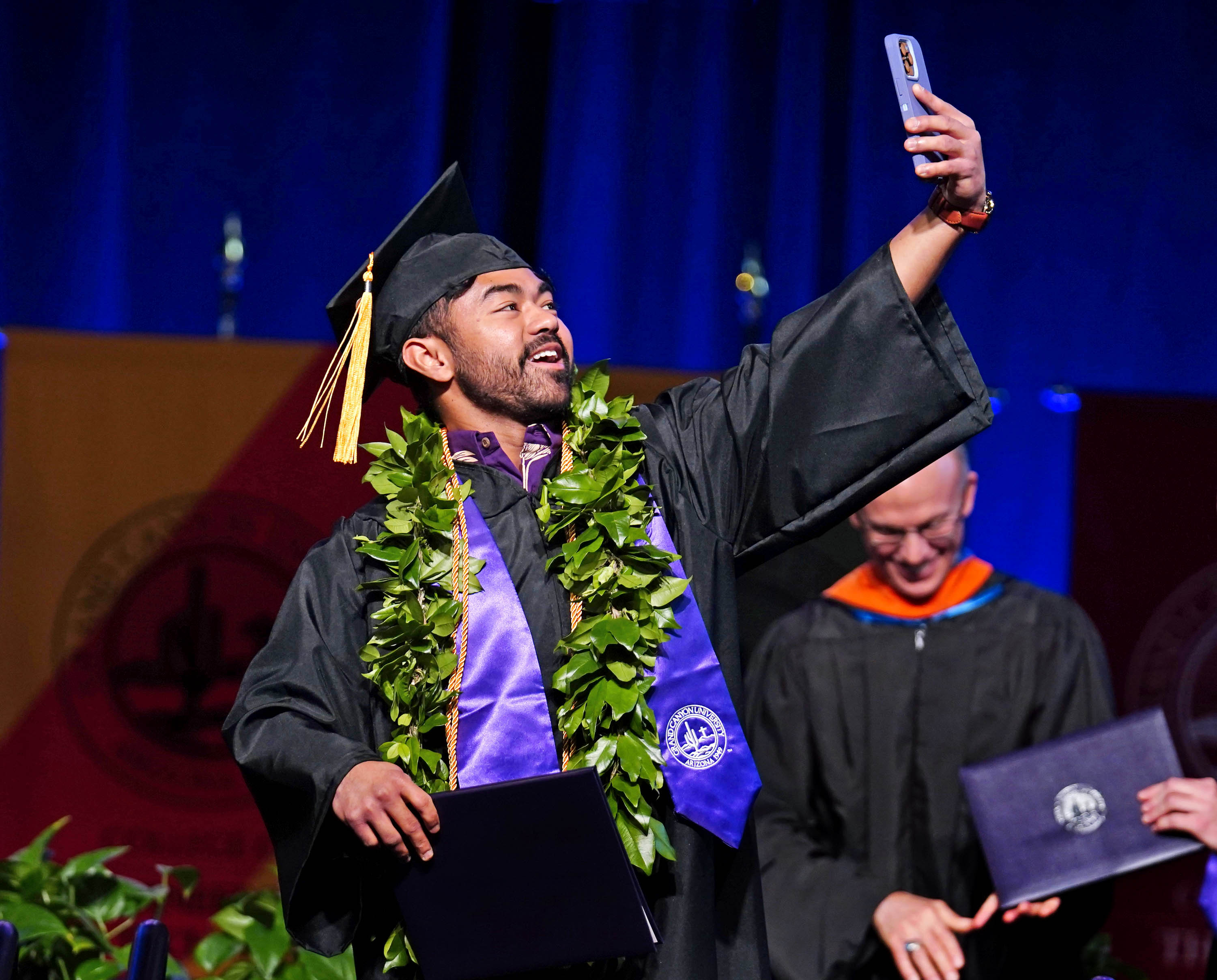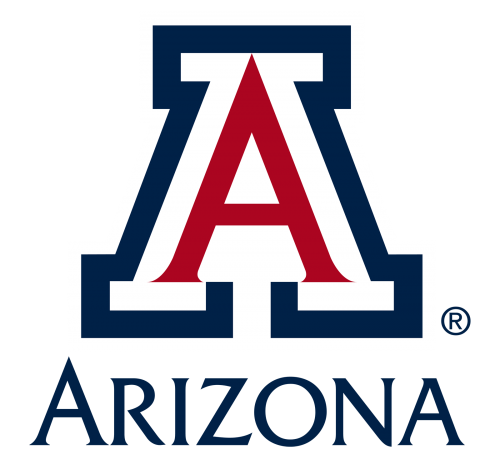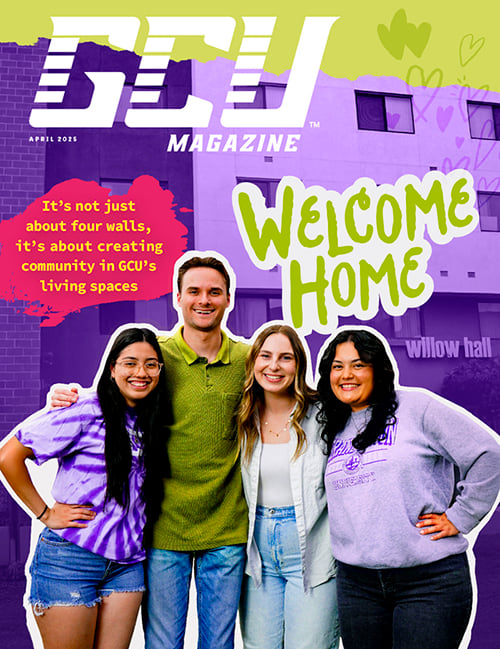
Story by Rick Vacek
Photos by Suede Williams
GCU News Bureau
The sports industry thrives on partnerships, so it only makes sense that the Colangelo School of Sports Business at Grand Canyon University has its own connections that show students how to turn networking into full-time employment.
They got another first-hand lesson Tuesday when two professional race drivers – Justin Allgaier of the NASCAR Xfinity Series and Ben Rhodes of the NASCAR Camping World Truck Series – visited campus.
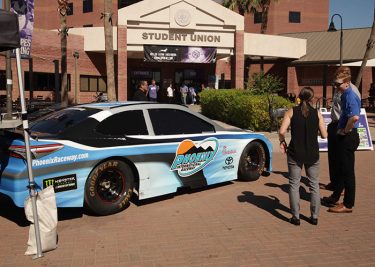
The drivers did a one-hour question-and-answer session in a packed lecture hall, then spent another hour in front of the Student Union answering more questions, showing off one of the cars and handing out free tickets to the Phoenix International Raceway (PIR) events Nov. 10-12.
Nearby stood Adam Johnson, a 2016 GCU graduate who has gone on to become PIR’s Digital Content Manager. It’s a classic example of how to climb the corporate ladder: Johnson did an internship at the track while he was at GCU, was hired for a lesser role three months after commencement and then went full-time in January.
He is one of three PIR full-timers from GCU, which has sent well more than 150 students there for internships, job shadowing and other chances to network.
“It shows that if you take advantages of the opportunities that GCU provides, hard work will pay off,” said Johnson, who handles all of PIR’s social media accounts, sends out its newsletter and handles its mobile applications. “It just sometimes takes time – it took me seven months to get a full-time job.”
Now, Johnson wakes up every morning excited about being able to work in the sports industry. That was his goal when he decided to get his degree in Sports Management – except that it didn’t turn out at all the way he expected. He grew up in Minneapolis, far from the nearest NASCAR event.
“I always respected NASCAR, I always respected racing, but I never really was a fan,” he said. “Football is my passion. I love football.
“But after working in the sport, you realize they’re all pretty universal. They all have people behind the scenes, they all have athletes and they all have the media. … If you love the people, you’re going to love the job. I love the people, so I love NASCAR.”
Johnson’s ascendance at PIR fits the Colangelo College of Business blueprint exactly. His CCOB instructors and mentors kept emphasizing the importance of meeting people in the industry; his volunteer leader when he first arrived is now his boss.
“Like Jerry Colangelo says, it’s networking, networking, networking,” Johnson said of the Phoenix business icon whose name is on the college.
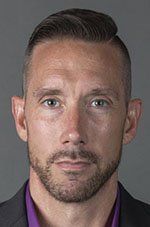
Life is relational, Colangelo frequently says, and the faculty makes sure that message is communicated.
“Our focus has always been – and this comes directly from Mr. C – that we’re a roll-up-your-sleeves, get-in-the-trenches-and-get-after-it kind of a program,” said Dr. Brian Smith, Director of the Sports Business school and Assistant Dean for CCOB. “What we really try to balance is three things: education, relationships and experiences.
“You can talk about marketing in a classroom or talk about how to run an event through a PowerPoint, or you can read this textbook, and there’s definitely value to learning that way. But there’s also no substitute for going out and doing.”
To that end, Smith said the college is creating incentives for students to make industry connections and is launching partnerships with various sports franchises.
“The ones who really want to get after it and work hard, there are going to be other opportunities,” he said “We’re even more laser-focused on careers, jobs and internships for students.”
The classroom work is geared to make that happen by focusing on three different types of jobs: creating content, distributing content and solving the problems of those who are creating and distributing the content.
“We’re really trying to get our students to understand the variety of what’s out there, the challenges and the opportunities that are there, and then when we start to research, we want them to start thinking about where they might fit in some of those components of those three different areas,” said Dr. Rick Roth, a Sports Business instructor.
“We don’t just develop sports salespeople or sports managers. We’re looking to create opportunities in any sports area.”
What made the drivers’ appearance Tuesday all the more valuable was that students got to learn about the relationship between racing teams and their sponsors. Every professional sport these days partners with major corporations, but NASCAR has been racing far ahead of the pack for years.
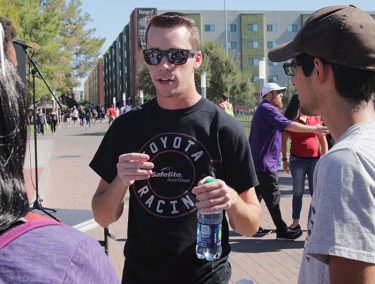
“In our sport, business goes hand-in-hand with competition,” said Scott Rovn, PIR’s Vice President of Sales and Marketing.
Both drivers gave samples of their victory speeches, which contain a mention of every one of their sponsors for a very good (and lucrative) reason: They get bonuses for thanking each one by name but get penalized if they forget one.
Public relations is an enormous part of the job. Rhodes goes into a city as many as four days in advance, mainly to mingle with a sponsor’s employees. He even has to submit monthly analytics reports from his Twitter account, which he is careful to keep opinion-free.
“You have to be ‘on’ all the time,” he said. “… The new age driver has to know his way around the conference room and the boardroom just as much as he knows his way around the track.”
Pretty heady stuff, especially when you consider that Rhodes is only 20 years old. But then, look at what Johnson is doing just a short time after graduating from GCU.
Asked what he would tell current students, he replied, “Have faith because there are going to be some nights when you’re in bed wondering, ‘Man, why don’t I have a job lined up? Why this? Why that?’ Keep making connections. Email people even if you know it might not lead to something. You never know whom you’re going to meet and when.”
Sports Business students will get more opportunities like this in the next 10 days. Ed Erhardt, President of Global Sales and Marketing for ESPN, is scheduled to speak to business classes Thursday, and Colangelo is on the calendar for a presentation with Fox 10 sports anchor Jude LaCava at 5:30 p.m. Thursday, Nov. 2 on the second floor of the Student Union.
“It’s bringing in people who care, who just want to be involved and get energized by mentoring and helping students,” Smith said. “They’re not asking for anything back other than, ‘Hey, I’ve achieved success and I want to give something back to the students. I know I had help when I was their age, and I want to do the same.’”
Or it even could be a professional racing driver who’s about the same age. The partnerships in sports affect people at all levels of the industry, and it’s never too early to start networking. But waiting until after graduation? That might be too late.
Contact Rick Vacek at (602) 639-8203 or rick.vacek@gcu.edu.


